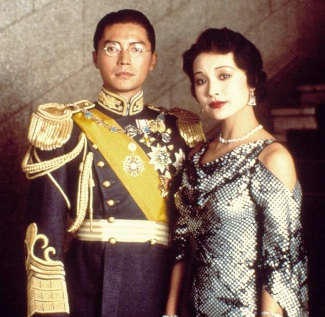 Bernardo Bertolucci’s epic about the life of Pu Yi, China’s last emperor, is a biting depiction of the emptiness of power.
Bernardo Bertolucci’s epic about the life of Pu Yi, China’s last emperor, is a biting depiction of the emptiness of power.
The Last Emperor, a 1987 film from director Bernardo Bertolucci, who co-wrote the screenplay with Mark Peploe, tells the life story of Pu Yi, who ascended the throne of China in 1908 at the age of three, and was eventually deposed. It’s told in flashbacks during his detention and “reeducation” at a prison camp in the 1950s.
Here Bertolucci found a chance to express his political ideas, and another outlet for his love of working on an epic scale. The government of China gave him permission to film in the Forbidden City, and his version of that historical environment, with its archaic pageantry and poisonous isolation, is awesome in detail, as the movie’s flow of imagery and color is as well. The bright reds in the scenes of childhood form a meaningful contrast with the drab grays and blues of the scenes in the prison.
More important than the film’s formal technique, however, is its use of the epic form to portray an unusual vantage point on modern history. Pu Yi represents the ancient ways, the heirarchy that had ruled for centuries, but which was already on the way out at the time of his birth. He thus stands at a crossroads, a figure stuck in the past through no choice of his own, literally imprisoned by his own rule as emperor, and, despite an urge to escape to the outer world, mentally imprisoned as well. The emperor is really a pawn, and later, by his own tragic choice, he becomes a puppet of the Japanese. Thus the great spectacle of modern history is displayed from the point of view of a supposed leader, who is actually almost a passive observer swept along by the tide, just as millions of victims were swept along by the murderous forces let loose in that deadly 20th century.
John Lone plays the adult Pu Yi with a fragile, tentative sort of dignity. We can see the young man struggling to maintain the pretence of power. The later scenes in Manchuria, when he has fooled himself into reprising the role of emperor with Japanese support, are heartbreaking. Slowly it dawns on him that he has chosen complete ruin for his lot. In the role of the empress, Joan Chen expertly portrays the transformation from loving hearted girl to bitterly disillusioned woman. Peter O’Toole lends his arch, amusing English manner to the role of the Emperor’s tutor, Johnston. His performance is almost hypnotic.
Success sometimes has a way of inspiring skepticism. The Last Emperor ended up winning nine Academy Awards, including best picture and director, and one of the unexpected results of this is that the film gained the stuffy aura of respectability. More than one critic has complained that the title character is too passive, as if that wasn’t exactly the point. Admittedly, Bertolucci is missing a certain something—I’m tempted to call it “soul” for lack of a better word—that would deepen his film and allow the elements to cohere in a way that strikes the heart. But rather than wish that the director had genius in addition to talent, I choose to appreciate what he did attain: a remarkable view into a world of ancestral greatness that has become ineffectual. In its sly fashion, The Last Emperor is saying that the individual nowadays, faced with the nightmare of history, would most likely wish for the same thing as the emperor turned humble gardener—to be left in peace.

Jesse Eisenberg has an odd sense of humor. His latest film, his second as writer and director, is called A Real Pain, and the...

George Segal plays an American corporal whose wheeling and dealing makes him a kind of king within the narrow world of a Japanese prisoner...

A portrait of a creative genius, a conductor and composer played by Cate Blanchett, explores the dark and unacknowledged heartlessness behind the vigor and...